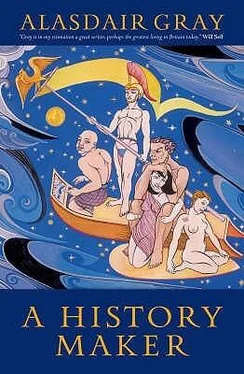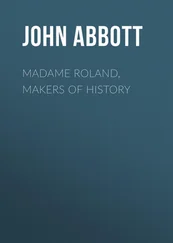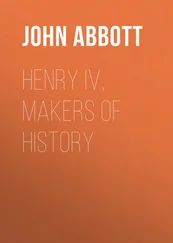The first of the national plantations reached maturity near the end of the century, after which the foreign imports of nations possessing them dwindled to zero. By this time every country in the world was following their example though in highly organized police states (Britain and the U.S.A. were the last) an underclass was maintained for many years by denying powerplant housekeeping to folk herded in ancient cities which were used as concentration camps, causing the destruction of several beautiful buildings (Saint Paul’s Cathedral, for example) which the modern world would have preserved as song schools, exhibition halls or travellers’ hotels.
Page 36.
clyped = to have made public a private matter which the publicizer was expected to keep private. The noun clype (sometimes clype-clash ) means, one likely to inform on others. sleekit = soft and smooth to the touch. In a great poem Burns applies it affectionately to a field mouse. Applied to a person, however, it connects with the adjective slee meaning clever, skilful, deft, but also furtive or cunning, therefore not to be trusted.
Page 38.
blethering = making a wordiness as senseless as those windblasts Yorkshire farmers call wuthering , but less offensively than is implied by blustering . It derives from the Old English word for bladder or windbag.
obstrapulous = loudly or assertively troublesome, from the Latin adjective obstreperus meaning noisy.
Page 39.
weans = infants or children, so almost synonymous with bairns, but tending more to the baby end of human growth.
The world holds hardly a dozen tribes of professional Amazons.
Greek legends say the Amazons were a nation of women on the banks of the Danube whose strength in battle kept them independent of men. They had a wholly female population because they conceived from the men of a neighbouring nation, getting rid of male offspring at birth. In the eighteenth and nineteenth centuries European travellers gave the Amazon name to large female regiments who fought for the African kingdom of Dahomey. Sometimes conscripted before birth — often recruited from slaves — trained to endure pain, fight in the hardest areas of combat and wholly at the disposal of their king and his chieftains when out of it — they had as little independence as other soldiers of the historical epoch. Through most of history women only attached themselves to armies when they had no better livelihood. Homeless travelling women lived parasitically on equally parasitic hordes of male mercenaries, trading sexual relief and alcohol for money between the battles, trading water and crude medical help for anything they could get during them. With total nationalization of warfare in the twentieth century women were conscripted into army storekeeping, driving and signal work. Few were directly employed to shoot and bomb people.
The independent female armies imagined by the Greeks only appeared in the early modern era. Every continent but Antarctica got two or three Amazon Warrior houses, none recruited from local clans but drawing highly combative volunteers from all parts of the globe. Broadcasts of their battles were highly popular with men, but since modern Amazons refused to recognize the Geneva Conventions no male army dared fight them. They had nothing in common with North American military sisterhoods who dressed in parodies of male combat dress, marched to war beside their brothers and lovers, lined up on the edge of battlefields and incited their clans to greater efforts with choral chanting and synchronized body jerks. Counted together the military sisterhoods and Amazons were less than 0.05 % of the world’s female population. Since warfare stopped invading their homes or supporting their families over 99.95 % of women have avoided it. Many younger women, however, still found fighting men more attractive.
Page 40.
neep = tumshie or turnip.
Page 44.
stoor = tiny particles in a chaotic or stirred-up state. In Lament for the Makaris Dunbar uses it for the dust clouds raised by battling warriors. In To a Mountain Daisy Burns applies it to newly ploughed topsoil. It can also mean windblown spray. Twentieth-century Scots most frequently applied it to fluff collected in vacuum-sweeper bags.
Page 45.
Groombridge … was testing my fitness for immortality.
Since dead parents and friends meet and talk with us in dreams we are sure to return as dreams in the heads of those who remember us. Folk who entertain others with tremendous examples, ideas, stories and music can survive in thoughts and actions for many years after their deaths. This was human immortality until the twenty-first century when a federation of transnational pharmaceutical companies (who pretended to be competing for tax avoidance purposes) found a treatment which could make bodies younger again. They could not be made younger than when the treatment began, but after seven years they could be restored to the exact state they were in when it began. The rejuvenated brain cells had therefore no recollection of the previous seven years.
No biological solution has yet been found to this problem, which scientists called the Struldbrugg factor from Jonathan Swift’s diagnosis of it in 1726. A brain cannot contain more than a normal lifetime of experience without being wasted and warped by it, so youth can only be restored by undoing biological experience. However, the problem had a technical solution. Shortly before a person of thirty or forty was restored to their twenty-three-or thirty-three-year-old state they recorded a summary of what their renewed cells would find useful to know. Since the businessmen and scientists who financed and discovered this process valued information more than sensed experience they embraced the treatment but kept it secret. In the twenty-first century lifespans varied greatly from nation to nation and class to class, but competitive housekeeping ensured that malnutrition, disease, famine and warfare kept the average human lifespan for the whole planet less than forty years. The effect on even a prosperous nation of many people not dying would have been catastrophic.
Immortality only became possible for many after the creation of extra-terrestrial living room. By that time powerplant housekeeping had returned the earth to a stable ecology and most intelligent people had come to prefer sensed experience to manipulating units of information. Since fear of death is an obvious sign of an unsatisfying life few nowadays want their bodies to exist forever.
Page 50.
perjink = trim, neat, of smart appearance.
Page 55.
I hate women for their damnable smug security and for always being older than me, always older and wiser.
This spasm of rage against women from a man who personally preferred them to men was a symptom of the spreading war fever.

CHAPTER THREE — WARRIOR WORK
Page 59.
jorries = small glass or porcelain balls and the game children play with these on pieces of level ground. In Dumbarton it is called jiggies (from the verb jig meaning to turn or dodge quickly) and in other parts of Scotland, bools . It should not be confused with the bools played by adults with much larger, wooden balls on smooth green lawns, though the rules of play are similar.
Page 61.
whaups = curlews.
Page 63.
The Warrior house was built over the short river flowing into Saint Mary’s Loch from Loch of the Lowes.
Читать дальше













